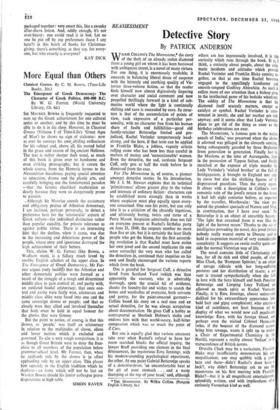More Equal than Others
Classical Greece. By C. M. Bowra. (Time-Life Books, 36s.) The Emergence of Greek Democracy: The Character of Greek Politics, 800-400 B.C. By W. G. Forrest. (World University Library, 12s. 6d.)
SIR MAURICE BOWRA is frequently requested to sum up the Greek achievement for one cultural series or another, and by this time he must be able to do it in his sleep. However, in Classical Greece (Volume I of Time-Life's 'Great Ages of Man') he shows no sign of staleness: now as ever he conveys his own, abiding enthusiasm for his subject, and, above all, his rooted belief in the grace and reason of the,ancient Hellenes. The text is rather shorter than usual, as much of this book is given over to handsome and even striking photographs; but it covers the whole course, from the Homeric heroes to the Alexandrian decadence, paying special attention to education, drama and the plastic arts, and carefully bringing out the fundamental paradox —that the Greeks cherished moderation so dearly because they were so dangerously prone to passion.
_Although Sir Maurice sounds the customary and obligatory praises of Athenian democracy, I am inclined, perhaps perversely, to detect a preference here for the 'aristocratic' aspects of Greek culture—for individual distinction rather than popular equality, for private tolerance as against public virtue. There is an interesting hint that the decline, when it came, was due to the increasing and deleterious power of the people, whose envy and ignorance destroyed the high achievement of their betters.
This, claims W. G. Forrest (like Bowra, a Wadham man), is a fallacy much loved by snobby English scholars of the upper class. In The Emergence of Greek Democracy, Mr For- rest argues (very lucidly) that the Athenian and other democratic polities were formed as a result of the struggle of a tough and determined middle class to gain control of, and parity with, an outdated feudal aristocracy; that once con- trol and parity were fairly won, aristocrats and middle class alike were fused into one and the same sovereign demos or people; and that so closely were they allied and involved_ thereafter that both must be held in equal honour for the glories that were Greece.
But the point to notice, of course., is that this demos, or 'people,' was itself an aristocracy in relation to the multitudes of slaves, aliens and lower natives which it excluded and governed. To cite a very rough comparison, it is as though Great Britain were to deny the fran- chise to all members of the population below grammar-school level. Mr Forrest, then, when he applauds rule by the demos is in effect applauding rule by an upper class. This places him squarely in the English tradition which he deplores—an irony which will not be lost on Warden Bowra should his junior colleague prove disputatious at high table.
SIMON RAVEN






























 Previous page
Previous page